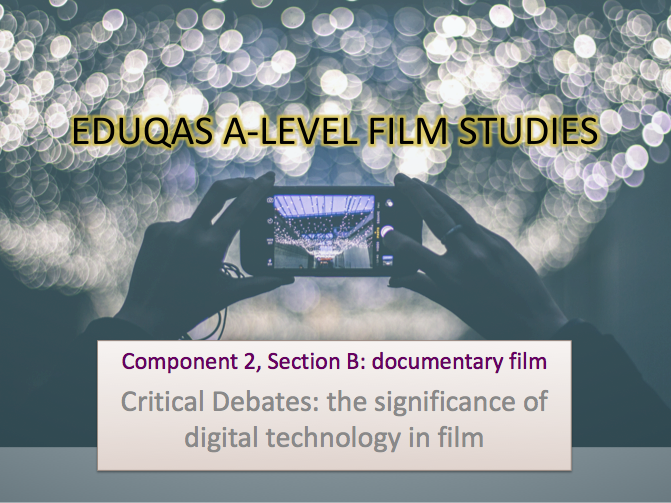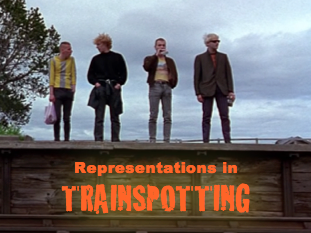57Uploads
12k+Views
2k+Downloads
Cross-curricular topics

Analysing Class representations in TRAINSPOTTING and FISH TANK (Arnold, 2009)
For **FILM STUDIES A-LEVEL **
This class exercise allows students to consider class representations in the 2009 UK independent film Fish Tank.
It will prompt discussion and allow students to think about how a variety of characters are represented.
The objective is for students to fill in their worksheets independently or in pairs, and then for each individual or pair to feedback to the whole group. In this way, a wide range of answers and insights can be explored.
The exercise could fill nearly an entire 1 hour lesson, depending upon the group size.

FILM STUDIES. Component 2B: Documentary: the significance of DIGITAL TECH
This fully interactive, colour slide presentation comprises 25 slides which include links to relevant YouTube videos, classroom exercises and exam questions.
The case study used for this particular slide presentation is ‘Sisters in Law’ but any of the films on the specification could be substituted.
This is a valuable teachring resource for the EDUQAS FILM STUDIES A-LEVEL.

Sisters in Law (Documentary) Close Study
This 37 full colour slide presentation provides an overview of the issues and filmmaking practices deployed in the production of Sisters in Law, a documentary by British filmmaker Kim Longinotto and Cameroonian filmmaker Florence Ayisi. The lesson revolves around the cinema verite practices used, transnational feminism, ‘post-feminism’ and its clichés, issues of representation, and the struggle for women’s rights within societies that are culturally mixed and traditionally patriarchal. Although these are complex issues, the resource is aimed at an A-Level (Year 12 / 13) learner, following the EDUQAS Film Studies Curriculum.
For this reason, there is focus on the filmmaking practices used as well as the human rights issues within the documentary. The presentation ends with an exam question from the Eduqas A Level Film Studies Specification, so that film studies students can apply the learning from the presentation. However, this resource could also form an interesting resource for social studies, media studies or African cultural studies. The human rights issues make this a widely applicable resource that could be useful across a variety of subjects. The content should fill a two-hour lesson and provides ample scope for class discussions and (for A-Level FIlm Students) exam practice.

REPRESENTATIONS IN *TRAINSPOTTING*
This is a set of notes to help for revision of TRAINSPOTTING for film studies A-Level candidates.
Representations analyzed include:
Nationality
Class
Gender
Age

Global Cinema Comparative Study: MUSTANG & TIMBUKTU
This 23 full colour slide presentation offers A-Level Film Studies Students many interactive exercises that will help them to compare and contrast these two films from global cinema. Mustang (Erguven, 2015, Turkey/France) tells the story of five sisters living in rural Turkey, where village and local Islamic traditions are still strictly enforced. Timbuktu (Sissako, 2014, Mauritania/France) dramatises the occupation of Northern Mali by Jihadist Islamists in 2012, and revolves around the real life story of a couple who were stoned to death for having a child out of wedlock.
The two films are studied as excellent examples of post-millennial global cinema and offer many points of comparison.
Both films offer means of studying religious debates, culture and global politics.
This presentation should fill an entire one hour lesson and may be extended into longer or more developed exercises.

TIMBUKTU - a film by Abderrahmane Sissako (2014)
This 40-slide full colour Power Point Presentation allows for a diverse range of topics to be studied. It covers history, culture, religious themes and filmmaking/media studies.
The film is about the destruction of culture and heritage, as well as occupation/colonialism, religious freedom, and human rights. The presentation also focuses on the film and its production, including representations and issues addressed by the filmmaker.
The film was produced to include the languages of the region in which it is set, including French, Tamasheq, English and other African dialects.
This resource facilitates rich discussion on topics such as: historical events, religious law, the value of cultural preservation and women’s rights.
It is appropriate for students aged 16 - 18. The violence of some events could be triggering for younger years.

Cinema Vérité: a Revolution in Documentary Style
This is a** fully animated** and illustrated (with helpful links integrated) overview of the Cinéma Vérité film movement, comprising 44 slides. Useful for teaching the EDUQAS A-LEVEL in FILM STUDIES (Documentary Component) as well as the IB in Film or Media Studies. The content covers how Cinema Verite ** evolved in the United States, UK, Canada and France. *A- Level FIlm Studies Tutors can use this for two entire lessons.
The PowerPoint presentation is to be used over a two-hour lesson and includes breaks for discussion and feedback, as well as the option to use the built-in links to video clips / examples. The presentation includes pictures, text, exercises and video links.
It is useful for teaching at A-Level, the International Baccalaureate, or as an introductory lesson at University Level.

Scottish Identity in TRAINSPOTTING
This study of the 1996 film TRAINSPOTTING by Danny Boyle explores how Scottish identity and culture are represented in the film.
This is a 46 Slide PowerPoint Presentation and it comprises sufficient material for a comprehensive lesson plan. This is useful for media studies, film studies and cultural studies. The resource explores how stereotypes, identity and representations are constructed in a media text.

Eduqas A-Level Film: Taxi Tehran (Contextual Study)
This full color, animated, interactive PowerPoint Presentation includes 49 slides with detailed discussion of context for the 2015 film. The context closely follows the Lisa Wardle Textbook to prepare A Level film studies students for the Component 2A. examination question. There are practice questions, exercises, and discussion prompts to get students involved in an interactive lesson. The resource should cover a full two hour lesson.
In addition this resource can be used for a contemporary cultural study of life in Iran. Panahi is an internationally celebrated director whose work (including Taxi Tehran) has won critical acclaim and major awards. This film offers a “way in” to Iran including its theocratic regime, its history and its artistic culture.
Themes explored: Women in Iran, Ethnicity, Representations of generational differences, history, crime & punishment, political dissent and its consequences and the nature of filmmaking itself.
Sale

Religious Studies: Marriage & the Family
This 30 slide full-colour interactive powerpoint presentation informs students about religious beliefs about marriage and the family. Topics covered include the Muslim and Christian marriage ceremony as well as Civil Partnerships, definitions of marriage, arranged marriages, reasons for marriage, roles in marriage, vows, the nature of families, cohabitation and same-sex marriage.
The resource helps students to prepare for the GCSE Exams in Religious Studies as well as helping students of religious faith to understand the rite of marraige and how religions and non-religious people view it.
The resource offers lots of discussion prompts to encourage class discussion.
This resource could be used as a two-hour lesson.

Post-Screening Discussion Questions - Film Studies - Raise the Red Lantern (1991)
**Raise the Red Lantern **(Dir. Zhang Yimou, 1991, China) is an excellent example of a film that deconstructs how
patriarchal power works and in this sense it is a film that is empowering for women, despite being a narrative *about *
disempowered women.
The film has also been discussed as a metaphor for Chinese state power and therefore also functions a a subversive political commentary.
With beautiful cinematography and composition throughout, this film is also a study in cinematic perfection, with mise-en-scene used to great symbolic effect. The film could be studied just as an excellent example of mise-en-scene.











